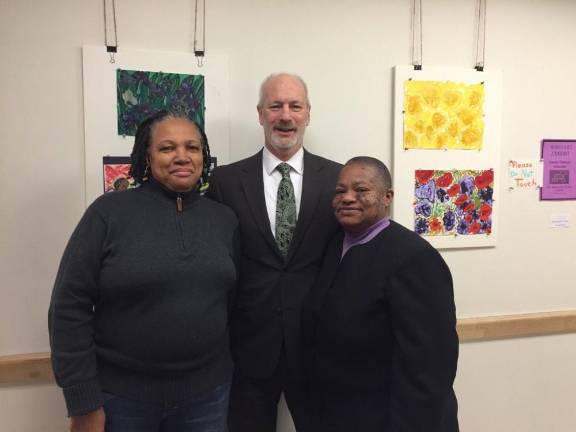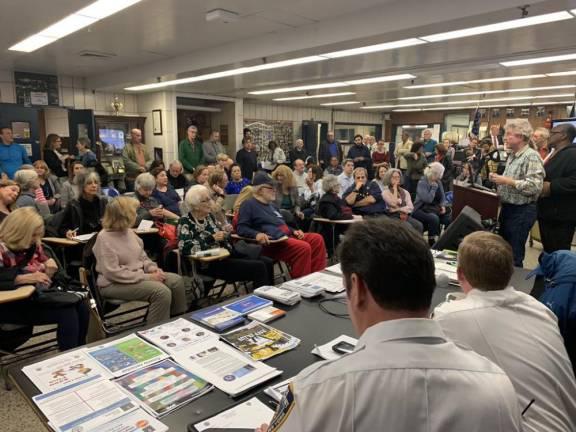A Focus on Empathy
CB7's new chair Mark Diller talks about how to face neighborhood challenges
At the start of November, the members of Community Board 7 elected a new leader in Mark Diller, who took over from Roberta Semer after her three years as chair.
Diller is returning to a role he's familiar with. He served as chair for two terms until 2013, when chairs were limited to two terms. In speaking about how to tackle the issues facing the Upper West Side, Diller continued to return to the idea of approaching these challenges with empathy — whether it be homelessness, school segregation, affordable housing or crime.
“I think that the answer to those challenges has to be a very determined combination of forward thinking, planning and personal empathy,” he said in an interview with the West Side Spirit last week.
An attorney by profession, Diller came to the community board through an interest in the neighborhood’s schools. He had been serving as the president of the Parent-Teacher Association for his son’s school district and was looking to take a new step in serving his community.
“One of the things that happens when you get involved with PTA is you see the full panoply of needs of the students that are served by public schools, which, even in our very affluent neighborhood, included folks who didn't enjoy your share in that affluence,” said Diller.
He asked then-City Council Member Gale Brewer what his next step should be, and she told him to apply for the community board. In April 2008, he was appointed to the board.
'A Big Swing of the Pendulum'
So far in his tenure, he said the work he’s most proud to have been a part of was a project that intersected development and education. In 2010, he helped condition the construction of what is now PS 191 — almost entirely at the expense of the developers — with new development.
“This was a big swing of the pendulum for public schools,” Diller said. “And it achieved the purpose we all had the back of our minds, which is that P.S. 191 — [a] school that at one time served largely a population of folks from the Amsterdam Houses — was able to move into this brand spanking new state-of-the-art facility and was able to welcome more students.”
When Diller looks at some of the development currently underway on the Upper West Side, he worries about the kind of precedent it sets. Particularly in the case of 200 Amsterdam — a tower that topped out this summer but is tied up in litigation over the zoning laws — Diller said he wasn’t sure the project could pass the straight face test.
“It is a mockery to have a zoning lot that looks like a jigsaw puzzle when the jigsaw puzzle cutter fell asleep at the machine,” he said.“And it is a problem because if that is allowed to be the new normal, then these ultra tall buildings — whatever ultra tall means in your neighborhood — can become much more prevalent regardless of neighborhood character, and regardless of their impact on all sorts of things that impact livability and quality of life.”
In regard to some of the issues currently going on in the neighborhood, Diller said it’s important to listen to people and hear out their concerns, particularly when it comes to neighborhood safety.
High Profile Crimes
He said that he thought Deputy Inspector Timothy Malin, who commands the 20th police precinct, has had a good handle on several high profile crimes that took place in the neighborhood, including a daytime shooting at a public playground. But he said he didn’t blame residents for being fearful following these events.
“If I'm a dad and that playground where that happened, I'd be just as motivated and just as, frankly, scared, I assume, as those folks who were actually there were, and I'd want to do something about it — so I get it,” he said. “It's both true that we are statistically safer than we feel there as well at times. And so what we need to do is to be careful not to compromise the successes that we've had, while always looking for ways to be a little safer and so forth.”
For his third term as chair, Diller hopes to engage the Upper West Side community in a larger way.
“I want us to expand the scope and net of our community relationships, both with organizations and with individuals,” he said. “The community board is committed to being here for people for the needs that they want to bring our way and we welcome any challenge.”
“It is a mockery to have a zoning lot that looks like a jigsaw puzzle when the jigsaw puzzle cutter fell asleep at the machine." CB7 Chair Mark Diller on 200 Amsterdam Ave.

